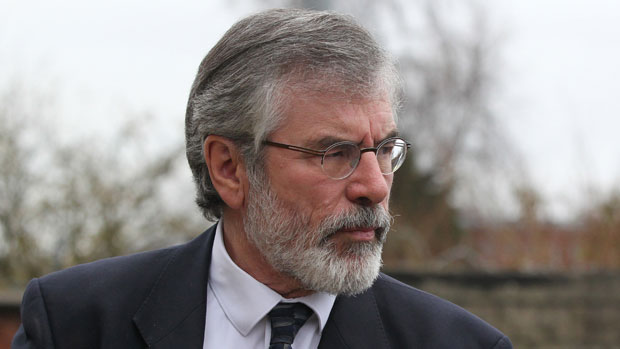How will Brexit affect Eire and Northern Ireland?
Sinn Fein calls for a referendum on reuniting Ireland – but Theresa Villiers quashes the idea

A free daily email with the biggest news stories of the day – and the best features from TheWeek.com
You are now subscribed
Your newsletter sign-up was successful
"Short of the outbreak of war," it is hard to imagine anything worse for Ireland than the news that the UK is to leave the EU, says the Irish Times.
So how will Brexit affect Ireland – and the only part of the UK to share a land border with an EU country, Northern Ireland?
How did Northern Ireland vote?
The Week
Escape your echo chamber. Get the facts behind the news, plus analysis from multiple perspectives.

Sign up for The Week's Free Newsletters
From our morning news briefing to a weekly Good News Newsletter, get the best of The Week delivered directly to your inbox.
From our morning news briefing to a weekly Good News Newsletter, get the best of The Week delivered directly to your inbox.
Like the population of Scotland, people in Northern Ireland chose to stay within the UK. Some 55.8 per cent voted Remain, slightly less than the 62 per cent of Scots. Wales joined England in voting Leave.
Could Northern Ireland leave the UK?
First Minister Arlene Foster, who campaigned to leave the EU, insisted this morning that the country would stay within the UK, despite the Brexit result. Howevr, her deputy, Martin McGuinness of Sinn Fein, called for a national referendum on reunification.
Might there be a 'border poll'?
A free daily email with the biggest news stories of the day – and the best features from TheWeek.com
The Good Friday Agreement provides for the holding of a referendum to determine whether the people of Northern Ireland want to remain part of the UK or join the Republic of Ireland. But Irish Prime Minister Enda Kenny said the referendum could only happen if Northern Ireland Secretary Theresa Villiers felt there had been a "seismic shift in public opinion", reports UTV.
Villiers poured cold water on Sinn Fein's challenge, saying there is "no reason to believe there would be a majority support for a united Ireland".
How will Brexit affect peace?
"Central to the Northern Ireland peace settlement was a slow but inexorable process of making the border less important," says the Irish Times. "Now it is about to get more important."
The paper says a "delicate" resetting of the relationship between Ireland, Britain and Northern Ireland will be needed to ensure Brexit does not threaten the peace process.
South of the border, "it is hard to see how the ultimate effects will be anything other than overwhelmingly negative", it adds.
What about trade?
Ireland's two biggest political and trading partners, the EU and the UK, are "sundered in a manner as yet unknowable", says the Irish Times. Whatever happens, for the republic, the immediate future will be a "period of difficulty and uncertainty unprecedented in the last 50 years" and "more destabilising" than the Troubles, it adds.
-
 Crisis in Cuba: a ‘golden opportunity’ for Washington?
Crisis in Cuba: a ‘golden opportunity’ for Washington?Talking Point The Trump administration is applying the pressure, and with Latin America swinging to the right, Havana is becoming more ‘politically isolated’
-
 5 thoroughly redacted cartoons about Pam Bondi protecting predators
5 thoroughly redacted cartoons about Pam Bondi protecting predatorsCartoons Artists take on the real victim, types of protection, and more
-
 Palestine Action and the trouble with defining terrorism
Palestine Action and the trouble with defining terrorismIn the Spotlight The issues with proscribing the group ‘became apparent as soon as the police began putting it into practice’
-
 Trump touts pledges at 1st Board of Peace meeting
Trump touts pledges at 1st Board of Peace meetingSpeed Read At the inaugural meeting, the president announced nine countries have agreed to pledge a combined $7 billion for a Gaza relief package
-
 Should the EU and UK join Trump’s board of peace?
Should the EU and UK join Trump’s board of peace?Today's Big Question After rushing to praise the initiative European leaders are now alarmed
-
 How corrupt is the UK?
How corrupt is the UK?The Explainer Decline in standards ‘risks becoming a defining feature of our political culture’ as Britain falls to lowest ever score on global index
-
 The high street: Britain’s next political battleground?
The high street: Britain’s next political battleground?In the Spotlight Mass closure of shops and influx of organised crime are fuelling voter anger, and offer an opening for Reform UK
-
 EU-Mercosur mega trade deal: 25 years in the making
EU-Mercosur mega trade deal: 25 years in the makingThe Explainer Despite opposition from France and Ireland among others, the ‘significant’ agreement with the South American bloc is set to finally go ahead
-
 Biggest political break-ups and make-ups of 2025
Biggest political break-ups and make-ups of 2025The Explainer From Trump and Musk to the UK and the EU, Christmas wouldn’t be Christmas without a round-up of the year’s relationship drama
-
 Who is paying for Europe’s €90bn Ukraine loan?
Who is paying for Europe’s €90bn Ukraine loan?Today’s Big Question Kyiv secures crucial funding but the EU ‘blinked’ at the chance to strike a bold blow against Russia
-
 ‘The menu’s other highlights smack of the surreal’
‘The menu’s other highlights smack of the surreal’Instant Opinion Opinion, comment and editorials of the day